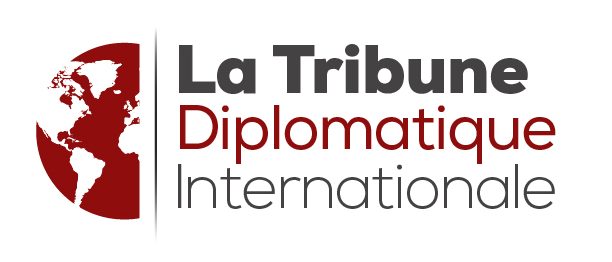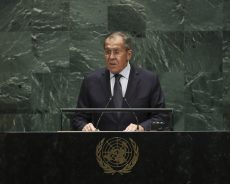![]()

Mohsen Abdelmoumen: How do you explain the outrageous warmongering of the oligarchy ruling the West, which is supporting Ukraine while plunging its population into poverty?
Dr. Anastasia Likhacheva: I do not see any contradiction here – nobody promised to take a better care on population. They sold a dream and bought some elite. It looks like an easy and cheap deal for the US business and Europeans, who voluntarily lost their major competitive advantages to cover any costs.
Dr. Anastasia Likhacheva: I do not see any contradiction here – nobody promised to take a better care on population. They sold a dream and bought some elite. It looks like an easy and cheap deal for the US business and Europeans, who voluntarily lost their major competitive advantages to cover any costs.
Why are Westerners so determined to dismantle Russia? And what explains the Russophobia of the Western ruling elites?
Nobody likes to admit their mistakes, especially if usually they pretend to provide normative power/lead the humanity towards better standards etc. And if you admit that you just do an old-school realpolitik, it disseminates your status. Either the West must admit that it is not a universal undisputable leader that they are the ones among other powerful states- or they must fight any challenger of this idea. And the former looks suicidal for Western elites nowadays.Moreover, there is some political inertia – anytime the West wants to unite and punish some country, they position it as a fight with universal evil.
However, I would consider it more cynically – the degree of Western hypocrisy is hard to overestimate. The day they find new politics towards Russia more favorable, we will see a wave of positive articles and tweets with no regret to previous sharp words. Pure Machiavelli in digital forms and liberal wording.
Don’t you think that all the institutions created by the Bretton Woods agreements are completely obsolete?
First, they do not reflect a real balance of power, demographics, potentials of various states. They do not represent properly interests of China, India, ASEAN, and Africa. They are physically based in the West, so it means that most of the world have to come as guests to solve their development or even survival problems. It does not mean that they can be easily thrown away. However, a demand for some alternatives has never been so vivid.
In various interviews I have spoken to high-ranking military and intelligence officers in the West, some of whom have told me that there is no longer any reason for NATO to exist. Don’t you think that this organisation, which is nothing more than a tool of the United States, should be dissolved?
I do believe that any international regime functions when several conditions work. First, it allows member-states to gain some profits from it. Second, they are established, led and managed by proper representation of power within the regime. So, from this prospective, we see, that the US built NATO in a way it wanted and could run. And definitely led to European security parasitism. As Josep Borrel called Europe a paradise garden surrounded by jungles – they were sure that someone else will protect it. As we saw with migration problem, US will involve in EU security problems if there is any concern for the US interests, otherwise – no. And European countries are not ready to act as normal states and pay, invest in and take profound care of their security.
Not forgetting Eastern Europe – they make a bet on active role in NATO and strongly support it. In case of good relations between major European economies and Russia, most of these states have nothing to do but transit. That is a less attractive perspective for their elites than outpost against Russia.
In Tucker Carlson’s interview with President Putin, the Russian President said that one of the most serious strategic mistakes made by US leaders had been to use the dollar as an instrument of international political struggle, the dollar being the basis of US power. What do you think?
I can hardly divide this question from the broader issue on the logic of US sanctions and its effectiveness. The theme is sticky; the consensus is that sanctions as such are not an effective tool, although sometimes they work under a number of circumstances. However, we can choose a logic that sanctions that increase the competitiveness and influence of the sanctioning country in the international arena we can consider them rather effective. And here, between the American and European sanctions programs against Russia, there is a gaping abyss. Daniel Drezner wrote a famous article about sanction paradox, where he proved that American sanctions work better against allies than against enemies. Now a new phenomenon has emerged – sanction parasitism, or an effective sanctions policy due to the irrationality of an ally. A different approach: how to make sanctions effective, not by causing heavier damage to the target country, but by weakening allies. And there are several arguments on the US rational here:
– Vulgar calculation of income and expenses is clearly in favor of the United States – on some extra LNG supplies to Europe (an increase of almost 3 times in physical volumes from 2021), the United States more than covered all its expenses for Ukraine.
– Growing problems, primarily in German economy due to the end of the era of cheap Russian gas, only play into the hands of American companies.
– The rearmament of Europe will create new income for the American military-industrial complex – both through direct supplies and through the capture of those markets where the Europeans sold themselves – and now they will produce more and more “in house”.
Moreover, the United States receives, albeit temporary, compensation for strategic damage – undermining trust in the dollar and American systems as an irreplaceable public good of globalization. For now, the main real competitor to the dollar in international payments and baskets is the euro. And the decline in its attractiveness against the backdrop of likely real problems in the eurozone is a serious help for the dollar for years to come, while the global financial system fragments.
This new phenomenon – sanctions parasitism, will largely determine the readiness of certain participants in the anti-Russian sanctions coalition to revise the regimes over time. Any change in sanctions that would strengthen the European Union will be blocked by the United States for as long as possible. Any concessions that would strengthen Germany would be sabotaged by Poland and France, which are less dependent on Russian gas. And so on. Therefore, it is likely that if Germany has enough agency to fight for its economy, we will see a serious fragmentation of the EU’s approach to sanctions in principle.
Isn’t it time to move away from US hegemony and towards a multipolar world?
We already find ourselves in a multipolar world. The real issue is to find and establish clear frameworks of how it works. Currently, we see a persistent test of a new system – from both state and non-state actors, empirical search of limitations and real boundaries. Unpredictability, lack of rational for many elites and policymakers are distinguishing marks of the end of first quarter of the 21ST century. Moreover, as since ancient times a key challenge for peaceful international relations is mistrust, we can hardly remember a less secure time since WWII.
Russia sees this new political economy with two levels of distrusts. First – to the old systems that have discredited themselves, but still bring a lot of benefits if you can use them without restrictions – like dollar for the US or UAE, or international shipping insurance in London – for Maersk.
And there is a serious lack of trust within the global majority. There is often no independent networks and infrastructure – both hard and soft – for cooperation, few past positive experience and lack of honest brockers/intermediaries, guides.
The emergence or non-emergence of such an infrastructure will determine the new international economic order. And this is a key playground for BRICS+ activities. Independent infrastructure as an open alternative. Not a complete and comprehensive substitute for dollar-based systems.
This process will become the central political economy process of the 21st century, just as colonization was in the 20th century (if we understand the decolonization of the 20th century as a redistribution of control over territories). Moreover, the redistribution turned out to be, firstly, localization of burden of obligations. The ability to extract a significant share of income and windfall profits has remained and has been multiplied by the new infrastructure.
Over the past 30–40 years, there have been no attractive alternatives to participate in globalization. The alternative was backwardness.
The poorly elected President Macron has declared that France should send troops to Ukraine to fight Russia. How do you explain this madness on the part of Western politicians?
Most of the so-called mad-politicians are very rational, but their ratio has little with strategic dimension. They plan their careers, and it is clear that monsieur Macron would prefer a nice job somewhere in the US after his unpopular presidency. We already saw a rapid withdrawal from politics my Mrs. Mareen, former prime minister of Finland, who decisively joined NATO. Now she enjoys well-payed consulting in London-based Tony Blair agency and think tank.
So an eagerness to conduct policies in US interests look very rational from this point of view. A new version of Atlantic solidarity truly works, in US interests. From professional point of view – well done job. From humanistic point of view, it means that even a bloody war in Europe will be welcomed by the US.
Along with a panel of Russian researchers, you took part in drawing up the report « Russia’s Policy Toward World Majority ». In your view, doesn’t Russia have a major historical role to play in building a multipolar world?
Actually, we always do. Russia played an integral and sometimes pivotal role in rise and fall of European concert of 19 century, bipolar world in 20, a decisive shift to unipolar moment and rise of multiparty – firstly suggested as an applied political construct by Evgeniy Primakov within trilateral format of RIC – Russia-India-China on late 1990s.
Nowadays partially because of sanction war against Russia, we have to elaborate new, pioneering regimes for international cooperation – more of a network than Hierarchical nature, less supranational and more truly inter-national. In finance, tech alliances, digital platforms etc.
Algeria and Russia are permanent targets of the Western oligarchy and its various neo-colonialist and imperialist circles. Would it not be in the interests of our two countries to further intensify their bilateral relations, bearing in mind that Algeria acquires most of its military equipment from Russia and that we have many common interests?
It definitely would be in both countries’ interests. While I still believe that we have to build this cooperation strategically preparing for a more diverse world, for systemic counter actions to our cooperation.
The 21st century may be different just by the redistribution of control over networks. Although the metropolis is still very attractive. So, cooperation of a new type means new hubs, new logistics/finance/standards, new stock exchanges and trade hubs. It is certain that the new infrastructure will be inconvenient and ineffective, at least at first. Exactly – less convenient than universal. This will result in:
– Growth in transaction costs
– Increasing volatility
– The problem of saving
– all three are direct products of economy of mistrust that shifted neoliberal model of globalized economy.
So how practically it can emerge? Driven by development race. Localization of income and excess income is important. The main bonus is the localization of development.
It is the imperative of development that is a game changer. What are technology sanctions and the law on Chips? This is an attempt to deter the development of other countries. Any restriction on the diffusion of technologies is an artificial retardation of development. A Russian-Algerian cooperation should be aimed exactly on development boost in both countries.
Interview realized by Mohsen Abdelmoumen
Who is Anastasia Likhacheva?
Dr. Anastasia Likhacheva has a PhD in International relations and works as a Dean at the Faculty of World Economy and International Affairs at the Higher School of Economics (HSE) in Moscow, Russia. Her key area of expertise includes geo-economics with a particular focus on sanctions, Eurasian integration and Russian foreign policy in Greater Eurasia.
She is author and co-author of more than 40 scientific publications, 70 analytical materials for public authorities, participant in more than 60 international and Russian conferences, including such venues as the Royal Geographical Society of Great Britain, UN World Water Week in Stockholm, the Association for International Studies in the USA, as well as Harvard, Beijing, Edinburgh Universities, Russian Academy of Sciences, etc.
In addition to academic research, Anastasia Likhacheva is active in expert work as a participant in high-level dialogues in India, China, the USA, Liechtenstein, a number of expert groups under the Ministry of Economic Development of the Russian Federation, the Ministry for the Development of the Far East of the Russian Federation, and international expert consortiums.
She had also run the ThinkArctic Project within the Program of Russian Chairmanship in the Arctic Council 2021-2023. In 2012, Dr. Likhacheva worked as a visitor fellow at the Davis Center at Harvard University. In 2016-2022, she has been a head of Russian Organizing Committee of the Working Group for the Future of Russian-American relations – a joint project led by HSE and Harvard University since 2010.




